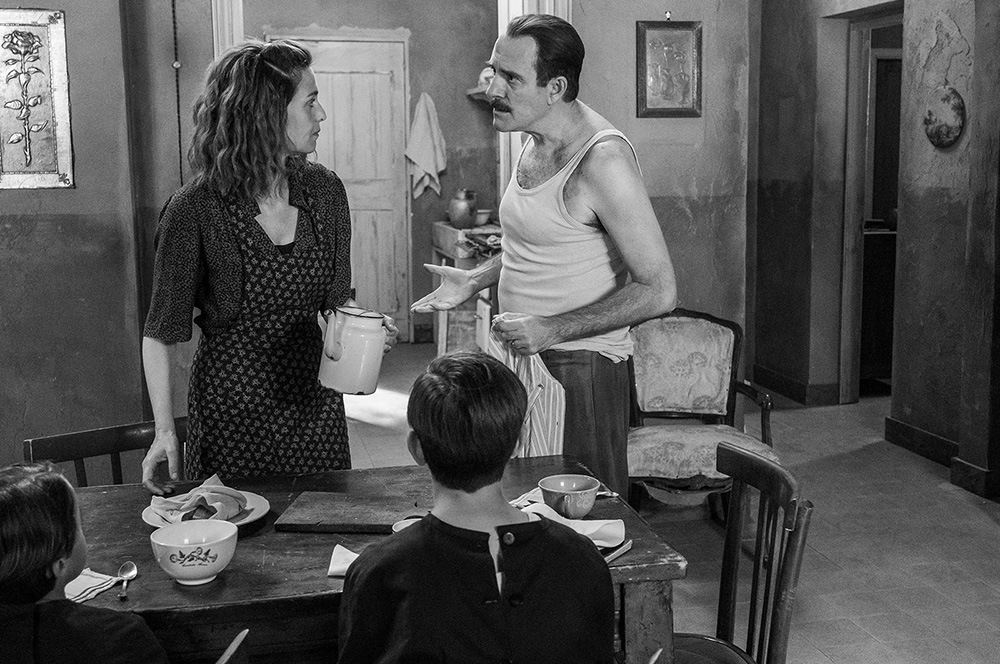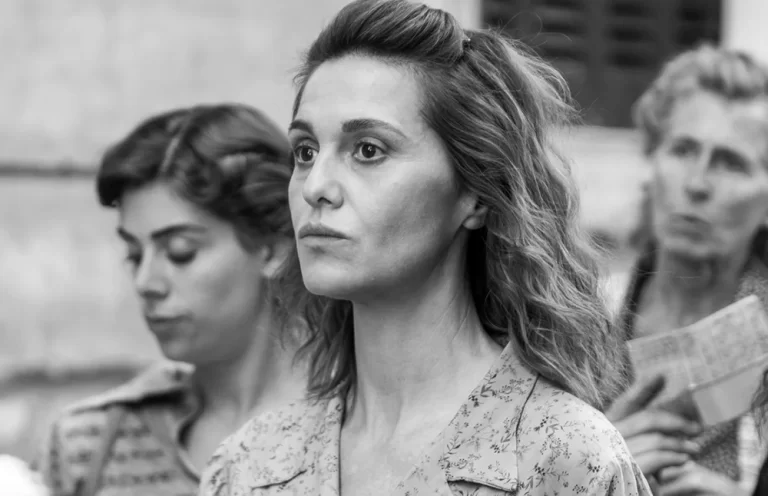Women could vote out the country’s monarch, but sadly many of them were still at the mercy of their dictator-like husbands and boyfriends. Keep all this in mind while watching “There’s Still Tomorrow” (directed by and starring Paola Cortellesi with a script by Paola Cortellesi, Furio Andreotti, and Giulia Calenda). The film is set in Rome in 1946 and references to women’s suffrage subtly pop up throughout it.
Abuse and its Casualness
Delia (Paola Cortellesi) is married to brutish Ivano (Valerio Mastandrea). To say Ivano abuses her is like saying rain is wet. In the first 60 seconds of the film, as morning dawns and Delia and Ivano wake up to a beautiful sunrise, Delia says “good morning” to Ivano. He instantly responds by giving her a harsh backhand slap to the face. What’s so jarring about Ivano’s abuse is the casual way he dispenses it. Whenever he slaps, punches, or chokes Delia, there’s no rage in his features. He does it casually, as if it’s as involuntary as a sneeze. Delia accepts the abuse because she feels there’s nothing she can do about it.
The couple have three children: teenage daughter Marcella (Romana Maggiora Vergano) and two young sons (Mattia Baldo and Gianmarco Filippini), whose names are never given but who reap all the benefits of being male— including going to school and getting an education, which Marcella has not been allowed to do. Even though Ivano never physically abuses his daughter the way he abuses his wife, he’s still quite content to limit Marcella’s life options simply because she’s female.
Director Cortellesi (with Cinematographer Davide Leone) captures the life of poor and working class Italians of that era perfectly, shooting the film in crisp black and white and making it feel at times like a lost Italian neorealism film from the late 1940s. Eat your heart out Roberto Rossellini!
The Old and the New

However, Cortellesi throws in some modern touches also, including the use of anachronistic music that gives the film a dynamic energy. In the opening credits sequence, Delia leaves her gloomy prison of a house and walks to the nearby tailor’s shop. As she strides past cafes, crumbling buildings, and graffiti-filled walls, a funky song plays. The song sounds akin to something out of a 1970s Blaxpoitation film like “Foxy Brown,” and it’s delightful. It’s so funky that if Quentin Tarantino heard it he’d start drooling.
Delia moves throughout the film with impenetrable dignity, never succumbing to despair as she works odd jobs to make extra money for the family. She keeps some of it for herself, hiding it from Ivano so she can use the money to eventually buy a fancy wedding dress for Marcella, who’s set to be married to the son of a rich restaurant owner. There are few bright spots in Delia’s life and Marcella is one of them. Her two sons are beyond obnoxious, always fighting with each other, destroying things, and cursing. It’s guaranteed they’re going to grow up to be the same awful adults their father is. Delia tolerates them—maybe she even loves them—but it’s Marcella she truly dotes over.
She’s determined to make Marcella’s life better than her own, despite the fact Marcella occasionally lashes out at her for taking abuse from Ivano, for being a “doormat.” When Delia learns something horrible about Marcella’s fiancé, she has to figure out a way to cancel Marcella’s wedding and risk Marcella hating her for the rest of her life.
Romance Under its Dark Layers
The other bright spot in Delia’s life is Nino (Vinicio Marchioni) an old flame of Delia’s who’s a car mechanic. She passes by his auto shop every day to speak to him or just get a glimpse of him… and who can blame her? Nino has the rugged good looks of a Roman warrior but a gentle vulnerability in his manner that makes you wonder why every woman in Rome isn’t queuing up at his station to “get their motors fixed.”

There’s a moment between Delia and Nino with a piece of chocolate that’s one of the most romantic scenes I’ve ever seen in a film. And no, it’s not pornographic or obscene, but is erotic and sweet, proof that under Delia has a passionate heart beating under all the numbness she shows toward the world.
A Very Lovable, Yet Hard Film
One day, Nino tells Delia that he’s going to have to close his shop and move hundreds of miles north to help his brother. He wants her to come with him and he’ll be leaving in a week. Again, it puts Delia at a crossroads. Should she go with him and leave her family behind? Both these subplots play out through the film as Delia works to make a happy ending for both Marcella and herself.
Despite some scenes of Delia being abused that were hard to watch, I loved “There’s Still Tomorrow,” and especially Delia’s character. Throughout the early parts of the film, I found myself getting as frustrated by her as Marcella. Why doesn’t she fight back? But as the film rolls on, you realize Delia’s playing the long game. She’s far smarter and stronger than most of the people around her. And Paola Cortellesi—through some masterful narrative sleight of hand—delivers a fantastic twist ending to the film that may not be what you expected, but it sure is satisfying.



